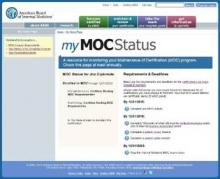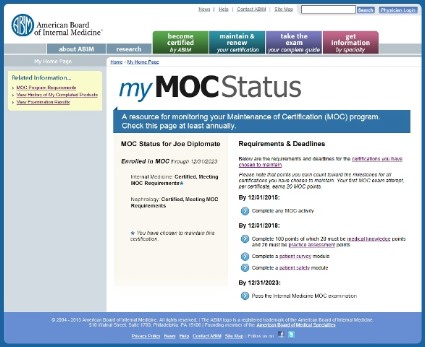User login
The American Board of Internal Medicine is shortening the time physicians have to earn Maintenance of Certification points, and the board on April 1 will begin publishing online whether physicians are currently meeting requirements for Maintenance of Certification.
The disclosures will appear on ABIM’s website as either "Meeting Maintenance of Certification Requirements: Yes" or "Meeting Maintenance of Certification Requirements: No." Officials at ABIM will update the one-line disclosure based on whether its diplomates have met the requirements for continuous participation in MOC.
Nearly all of the 24 medical specialty boards are already taking similar steps, with every board slated to publish compliance with MOC by the end of 2014, according to the American Board of Medical Specialties.
ABIM is also moving up its MOC program milestones. Every 2 years, physicians who are certified by ABIM must earn at least some points by completing some of the educational activities approved for MOC credit. At the 5-year mark, they must earn 100 points, as well as complete patient safety and patient survey activities, to be considered up to date with MOC. Previously, physicians were given 10 years to earn 100 points.
The schedule for the exam remains the same.
Physicians whose certifications expire this year need to earn 100 points and pass an MOC exam by the end of 2014 to maintain their certification. They will remain certified as long as they continue to meet MOC requirements.
Physicians whose certifications expire in 2015 and beyond must enroll in MOC by April 1 to be considered meeting MOC requirements. They have until Dec. 31, 2015, to earn MOC points to meet the 2-year requirement.
To simplify record-keeping for physicians, ABIM set up an online portal that allows physicians to check their status and find out their next step in MOC.
The new requirements affect all physicians who are certified by ABIM, including those with lifetime certifications, known as "grandfathers." Though those physicians who were certified by ABIM before 1990 can’t lose their certification, they will be marked as not meeting MOC requirements online if they don’t earn the required number of points.
Publishing information about whether grandfathers are participating in MOC is critical, explained Dr. Richard J. Baron, president and CEO of ABIM, because otherwise the board is reporting on decades-old information.
"We’re saying this person is certified, but all we know is something that happened 24 years ago," he said. "We wanted to create a pathway where grandfathers could say they are doing stuff, too. And lots of them are."
Dr. Baron insisted that the board is not breaking its promise to grandfathers by publishing their MOC status. Participation in MOC is voluntary, and they will never lose their certification by opting out, he said.
But not all physicians are happy about the MOC requirements.
Dr. Ron Benbassat, a board-certified internist in Los Angeles, has mounted an effort called Change Board Recertification to roll back the MOC process. The group, which has attracted thousands of physician members from various subspecialties and states, aims to significantly scale back the MOC.
The group wants all time-limited certificates to be converted back to lifetime certification. That’s the only way that MOC can truly be voluntary, Dr. Benbassat said.
"As long as MOC is being tied to hospital privileges, insurance participation, and reimbursement, and the boards continue to pursue linking MOC to state licensure, then it’s clearly no longer voluntary," he said.
The current MOC process is burdensome in terms of both time and money, Dr. Benbassat said, and only serves to enrich ABIM, not produce better doctors.
"The new rules are really no different from what they were before. They completely disregard the cost, the time, and the administrative burdens for completing them. And now it’s also impacting ‘grandfathered’ physicians, as their lifetime certificate status is in jeopardy as well," Dr. Benbassat said. "This is a money grab."
Dr. Ken Lee, an internist in Olympia, Wash., who is also involved with the group, said he thinks that MOC is a burden and doesn’t know any frontline physicians who have found the process useful.
"It doesn’t really help us in daily practice. I can’t really say that I’m using anything now that I learned from those exams," Dr. Lee said. "What they test you on is usually trivia."
ABIM acknowledges that their MOC offerings could be better.
"We can increase the quotient of meaningful, high-value work to busy work," Dr. Baron said. "That’s another thing that we hear a lot about, and we hear that loud and clear."
In addition to fine-tuning their educational products, ABIM is inviting more community physicians to be part of their process and become members of their boards and committees. "It really matters who is in the room," Dr. Baron said. "We’re now committed to having people in community practice in all the rooms."
But ABIM has no intention of rolling back the new continuous certification process, which it views as essential to ensuring for the public, hospitals, and payers that physicians are not falling behind on their medical knowledge and skills.
Dr. Baron said the previous process allowed physicians to cram all of their work into the final 2 years of the 10-year cycle and didn’t guarantee that they were sharpening their skills along the way.
"We knew that it wasn’t functioning as a continuous program, and we also knew that we were basically issuing a certificate and saying it lasts for 10 years," Dr. Baron said. "Our board was uncomfortable with both those things."
While the new process has more requirements and tight time frames, Dr. Baron said the board has worked to make sure that MOC work can also count toward other physician requirements, including CME credit, Medicare’s Physician Quality Reporting System, and Bridges to Excellence. Physicians also may be able to earn rewards or recognition from some health plans, he noted.
[email protected] On Twitter @maryellenny
The American Board of Internal Medicine is shortening the time physicians have to earn Maintenance of Certification points, and the board on April 1 will begin publishing online whether physicians are currently meeting requirements for Maintenance of Certification.
The disclosures will appear on ABIM’s website as either "Meeting Maintenance of Certification Requirements: Yes" or "Meeting Maintenance of Certification Requirements: No." Officials at ABIM will update the one-line disclosure based on whether its diplomates have met the requirements for continuous participation in MOC.
Nearly all of the 24 medical specialty boards are already taking similar steps, with every board slated to publish compliance with MOC by the end of 2014, according to the American Board of Medical Specialties.
ABIM is also moving up its MOC program milestones. Every 2 years, physicians who are certified by ABIM must earn at least some points by completing some of the educational activities approved for MOC credit. At the 5-year mark, they must earn 100 points, as well as complete patient safety and patient survey activities, to be considered up to date with MOC. Previously, physicians were given 10 years to earn 100 points.
The schedule for the exam remains the same.
Physicians whose certifications expire this year need to earn 100 points and pass an MOC exam by the end of 2014 to maintain their certification. They will remain certified as long as they continue to meet MOC requirements.
Physicians whose certifications expire in 2015 and beyond must enroll in MOC by April 1 to be considered meeting MOC requirements. They have until Dec. 31, 2015, to earn MOC points to meet the 2-year requirement.
To simplify record-keeping for physicians, ABIM set up an online portal that allows physicians to check their status and find out their next step in MOC.
The new requirements affect all physicians who are certified by ABIM, including those with lifetime certifications, known as "grandfathers." Though those physicians who were certified by ABIM before 1990 can’t lose their certification, they will be marked as not meeting MOC requirements online if they don’t earn the required number of points.
Publishing information about whether grandfathers are participating in MOC is critical, explained Dr. Richard J. Baron, president and CEO of ABIM, because otherwise the board is reporting on decades-old information.
"We’re saying this person is certified, but all we know is something that happened 24 years ago," he said. "We wanted to create a pathway where grandfathers could say they are doing stuff, too. And lots of them are."
Dr. Baron insisted that the board is not breaking its promise to grandfathers by publishing their MOC status. Participation in MOC is voluntary, and they will never lose their certification by opting out, he said.
But not all physicians are happy about the MOC requirements.
Dr. Ron Benbassat, a board-certified internist in Los Angeles, has mounted an effort called Change Board Recertification to roll back the MOC process. The group, which has attracted thousands of physician members from various subspecialties and states, aims to significantly scale back the MOC.
The group wants all time-limited certificates to be converted back to lifetime certification. That’s the only way that MOC can truly be voluntary, Dr. Benbassat said.
"As long as MOC is being tied to hospital privileges, insurance participation, and reimbursement, and the boards continue to pursue linking MOC to state licensure, then it’s clearly no longer voluntary," he said.
The current MOC process is burdensome in terms of both time and money, Dr. Benbassat said, and only serves to enrich ABIM, not produce better doctors.
"The new rules are really no different from what they were before. They completely disregard the cost, the time, and the administrative burdens for completing them. And now it’s also impacting ‘grandfathered’ physicians, as their lifetime certificate status is in jeopardy as well," Dr. Benbassat said. "This is a money grab."
Dr. Ken Lee, an internist in Olympia, Wash., who is also involved with the group, said he thinks that MOC is a burden and doesn’t know any frontline physicians who have found the process useful.
"It doesn’t really help us in daily practice. I can’t really say that I’m using anything now that I learned from those exams," Dr. Lee said. "What they test you on is usually trivia."
ABIM acknowledges that their MOC offerings could be better.
"We can increase the quotient of meaningful, high-value work to busy work," Dr. Baron said. "That’s another thing that we hear a lot about, and we hear that loud and clear."
In addition to fine-tuning their educational products, ABIM is inviting more community physicians to be part of their process and become members of their boards and committees. "It really matters who is in the room," Dr. Baron said. "We’re now committed to having people in community practice in all the rooms."
But ABIM has no intention of rolling back the new continuous certification process, which it views as essential to ensuring for the public, hospitals, and payers that physicians are not falling behind on their medical knowledge and skills.
Dr. Baron said the previous process allowed physicians to cram all of their work into the final 2 years of the 10-year cycle and didn’t guarantee that they were sharpening their skills along the way.
"We knew that it wasn’t functioning as a continuous program, and we also knew that we were basically issuing a certificate and saying it lasts for 10 years," Dr. Baron said. "Our board was uncomfortable with both those things."
While the new process has more requirements and tight time frames, Dr. Baron said the board has worked to make sure that MOC work can also count toward other physician requirements, including CME credit, Medicare’s Physician Quality Reporting System, and Bridges to Excellence. Physicians also may be able to earn rewards or recognition from some health plans, he noted.
[email protected] On Twitter @maryellenny
The American Board of Internal Medicine is shortening the time physicians have to earn Maintenance of Certification points, and the board on April 1 will begin publishing online whether physicians are currently meeting requirements for Maintenance of Certification.
The disclosures will appear on ABIM’s website as either "Meeting Maintenance of Certification Requirements: Yes" or "Meeting Maintenance of Certification Requirements: No." Officials at ABIM will update the one-line disclosure based on whether its diplomates have met the requirements for continuous participation in MOC.
Nearly all of the 24 medical specialty boards are already taking similar steps, with every board slated to publish compliance with MOC by the end of 2014, according to the American Board of Medical Specialties.
ABIM is also moving up its MOC program milestones. Every 2 years, physicians who are certified by ABIM must earn at least some points by completing some of the educational activities approved for MOC credit. At the 5-year mark, they must earn 100 points, as well as complete patient safety and patient survey activities, to be considered up to date with MOC. Previously, physicians were given 10 years to earn 100 points.
The schedule for the exam remains the same.
Physicians whose certifications expire this year need to earn 100 points and pass an MOC exam by the end of 2014 to maintain their certification. They will remain certified as long as they continue to meet MOC requirements.
Physicians whose certifications expire in 2015 and beyond must enroll in MOC by April 1 to be considered meeting MOC requirements. They have until Dec. 31, 2015, to earn MOC points to meet the 2-year requirement.
To simplify record-keeping for physicians, ABIM set up an online portal that allows physicians to check their status and find out their next step in MOC.
The new requirements affect all physicians who are certified by ABIM, including those with lifetime certifications, known as "grandfathers." Though those physicians who were certified by ABIM before 1990 can’t lose their certification, they will be marked as not meeting MOC requirements online if they don’t earn the required number of points.
Publishing information about whether grandfathers are participating in MOC is critical, explained Dr. Richard J. Baron, president and CEO of ABIM, because otherwise the board is reporting on decades-old information.
"We’re saying this person is certified, but all we know is something that happened 24 years ago," he said. "We wanted to create a pathway where grandfathers could say they are doing stuff, too. And lots of them are."
Dr. Baron insisted that the board is not breaking its promise to grandfathers by publishing their MOC status. Participation in MOC is voluntary, and they will never lose their certification by opting out, he said.
But not all physicians are happy about the MOC requirements.
Dr. Ron Benbassat, a board-certified internist in Los Angeles, has mounted an effort called Change Board Recertification to roll back the MOC process. The group, which has attracted thousands of physician members from various subspecialties and states, aims to significantly scale back the MOC.
The group wants all time-limited certificates to be converted back to lifetime certification. That’s the only way that MOC can truly be voluntary, Dr. Benbassat said.
"As long as MOC is being tied to hospital privileges, insurance participation, and reimbursement, and the boards continue to pursue linking MOC to state licensure, then it’s clearly no longer voluntary," he said.
The current MOC process is burdensome in terms of both time and money, Dr. Benbassat said, and only serves to enrich ABIM, not produce better doctors.
"The new rules are really no different from what they were before. They completely disregard the cost, the time, and the administrative burdens for completing them. And now it’s also impacting ‘grandfathered’ physicians, as their lifetime certificate status is in jeopardy as well," Dr. Benbassat said. "This is a money grab."
Dr. Ken Lee, an internist in Olympia, Wash., who is also involved with the group, said he thinks that MOC is a burden and doesn’t know any frontline physicians who have found the process useful.
"It doesn’t really help us in daily practice. I can’t really say that I’m using anything now that I learned from those exams," Dr. Lee said. "What they test you on is usually trivia."
ABIM acknowledges that their MOC offerings could be better.
"We can increase the quotient of meaningful, high-value work to busy work," Dr. Baron said. "That’s another thing that we hear a lot about, and we hear that loud and clear."
In addition to fine-tuning their educational products, ABIM is inviting more community physicians to be part of their process and become members of their boards and committees. "It really matters who is in the room," Dr. Baron said. "We’re now committed to having people in community practice in all the rooms."
But ABIM has no intention of rolling back the new continuous certification process, which it views as essential to ensuring for the public, hospitals, and payers that physicians are not falling behind on their medical knowledge and skills.
Dr. Baron said the previous process allowed physicians to cram all of their work into the final 2 years of the 10-year cycle and didn’t guarantee that they were sharpening their skills along the way.
"We knew that it wasn’t functioning as a continuous program, and we also knew that we were basically issuing a certificate and saying it lasts for 10 years," Dr. Baron said. "Our board was uncomfortable with both those things."
While the new process has more requirements and tight time frames, Dr. Baron said the board has worked to make sure that MOC work can also count toward other physician requirements, including CME credit, Medicare’s Physician Quality Reporting System, and Bridges to Excellence. Physicians also may be able to earn rewards or recognition from some health plans, he noted.
[email protected] On Twitter @maryellenny



